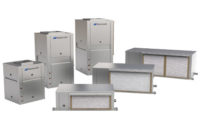The Kimpton® Hotels and Restaurant’s commitment to a sustainably minded guest experience doesn’t just include an in-room yoga mat and organic snacks and beverages. In fact, elements of the Kimpton EarthCare program, including more than 100 environmental practices and products implemented at all Kimpton hotels and restaurants in the U.S., have been in place since as early as the company’s inception in 1981.
Among a myriad of practices to reduce waste, minimize toxins, and conserve resources across all business functions, Kimpton maintains its own set of EarthCare green building guidelines, including employing energy-efficient lighting and HVAC systems. Additionally committed to maintaining substantive, meaningful goals for energy reduction, the company has also examined ways in which to elevate energy efficiency across its historic building properties.
This was recently reflected in the company’s transformation of the Hotel Palomar Philadelphia, which, while maintaining its striking architectural charm, had become antiquated in its mechanical operations and overall energy efficiency. The 156,650-square-foot, 25-floor Art Deco hotel was originally constructed in 1929 and housed an architect’s office, thus earning it the title of “Architect’s Building.” Following its acquisition by Kimpton in 2008 and transition into the boutique hotel it is today, the building was slated for an extensive renovation in 2009 that included several initiatives to vastly improve the energy efficiency and overall sustainability of the property.
Typical to a historic renovation of this scope, the mechanical and construction teams enlisted by Kimpton management were faced with some notable challenges, including working within the tight constraints of the bustling city center location of the property. The project demanded creativity, ingenuity, and the use of high-quality, reliable products and systems, particularly in order to achieve an ultimate goal of earning LEED® certification from the U.S. Green Building Council (USGBC).
The renovation focused on restoring existing historical elements, while also improving overall energy efficiency and reducing waste. In addition to installing more energy-efficient double-paned windows, replacing toilets and sinks with low-flow systems, replacing all lighting with CFL [compact fluorescent lamp] and LED bulbs, and using recycled and sustainable materials, the hotel renovation included replacement of the property’s old boiler water heater with a water-source heat pump system from ClimateMaster.
San Diego-based Exp (formerly X-nth), a consulting building engineering firm, designed the new mechanical system for the hotel.
“We built a system that would be economical and energy efficient, while also allowing for maximum guest comfort,” said Todd Sorbo, principal at Exp. “Kimpton has always valued efficiencies and quality, so we determined that a heat pump system would be the best solution.”
Encompassing all guest rooms, meeting and commercial spaces, common areas, and the Hotel Palomar’s restaurant, the new 210-ton mechanical system design incorporated more than 300 ClimateMaster heat pump units, including 293 horizontal Tranquility® 20 Single-Stage (TS) Series units and eight Tranquility Vertical Stack (TRM) Series units.
“These units offered an innovative solution for the project, and particularly for the guest rooms, in which individual, quiet control of the heating and cooling system was important,” said Sorbo.
“Retrofitting a historic building into a modern hotel has its challenges,” said Jim Kohler, project manager with Tracey Mechanical, the project’s mechanical contractor. “But the new heat pump system that we put into place was a good fit for the needs of the hotel, especially in regard to improving energy efficiency while needing to work within the constraints of an existing and historically protected infrastructure.
“Each guest room in the hotel was equipped with a smart digital thermostat that communicates to a control board in the in-room ClimateMaster unit to sense occupancy,” Kohler said. “That way, if a room remains unoccupied for so many hours, it would shut off the pumps in order to reduce unnecessary energy usage. That, in combination with the highly efficient MERV 11 filters and the chemical-free water treatment system in the ClimateMaster units, helped the hotel achieve optimal energy performance.”
The Hotel Palomar renovation was completed in October 2009, and has since resulted in several notable green building milestones for the property and for Kimpton at-large. This includes becoming Kimpton’s 11th adaptive reuse property, as well as earning a LEED Gold certification from the USGBC in September 2010.
“For many hotels, HVAC can be the No. 1 issue with inefficiencies,” said Rod Temistocle, area director of engineering for Kimpton Hotels. “With the units we currently have in place, Hotel Palomar has seen a significant reduction in energy use.”
Information presented courtesy of Jennifer Parker, Parker PR Inc., on behalf of ClimateMaster Inc. For more information, visit www.climatemaster.com.
Publication date: 1/20/2014
Want more HVAC industry news and information? Join The NEWS on Facebook, Twitter, and LinkedIn today!










